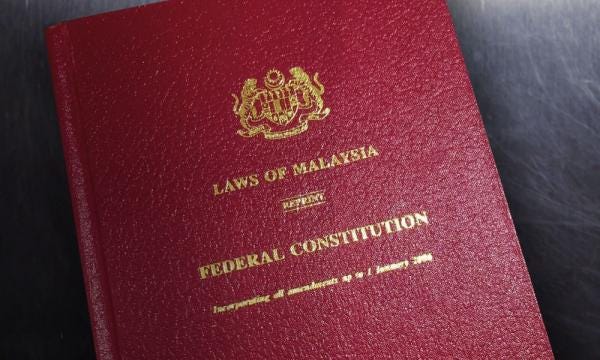
Murray Hunter
Language Should Not Be Weaponised — Declaring the BM Version of the Constitution as “Authoritative” Threatens Legal Clarity and Sabah-Sarawak Rights
Daniel John Jambun
Jul 22, 2025

In response to the recent statement by lawyer Haniff Khatri Abdulla, who urged that the Bahasa Malaysia (BM) version of the Federal Constitution be declared the authoritative text, we wish to express our deep constitutional and legal concerns, especially regarding its implications for Sabah and Sarawak.
While the proposal may be framed in the name of linguistic nationalism or patriotism, its impact — if implemented blindly — could undermine the very foundations of Malaysia’s legal system and the federal balance established under the Malaysia Agreement 1963 (MA63).
Let us be clear: this is not merely a linguistic or symbolic issue — it is a serious legal and constitutional landmine.
1. The Original Constitution Was Drafted in English Based on the Common Law Tradition
Malaysia’s original Federal Constitution was drafted in English by the Reid Commission, based on the British common law system. It employs legal terms and technical language that often have no direct equivalent in Bahasa Malaysia. Any translation — however well-intentioned — will inevitably fail to fully capture the meaning, nuance, and intent of the original text.
Replacing the English version with a BM translation as the binding legal text would create confusion, inconsistency in legal interpretation, and open the door to political manipulation of constitutional meaning.
2. Judicial Confusion and the Erosion of Precedent
If the BM version is made authoritative, the entire body of legal precedent built on the English text may be called into question. Even more troubling, future court decisions may shift away from settled legal doctrines and be based on vague, politically-contested interpretations of BM phrases.
This would create legal instability and uncertainty over rights — a situation that benefits only those seeking to manipulate the system for ideological or political gain.
3. A Direct Threat to Sabah and Sarawak’s Constitutional Protections
For Sabah and Sarawak, this proposal is a direct assault on constitutional rights guaranteed under MA63.
Article 161(1) of the Federal Constitution clearly states that English may continue to be used as an official language in Sabah and Sarawak. This is not merely administrative — it is a constitutional right and a term of entry into the Federation.
To declare the BM version authoritative without the express consent of Sabah and Sarawak would violate both the spirit and the letter of MA63. It would amount to a unilateral alteration of a binding federal compact.
4. Article 160B Must Not Be Applied Blindly
Supporters of this move frequently cite Article 160B. However, that article is discretionary — it empowers the Yang di-Pertuan Agong to declare the BM version authoritative, but it does not mandate it.
Any invocation of Article 160B must be carried out with utmost caution, with thorough consultation involving all stakeholders — including state governments, civil society, and the judiciary. Otherwise, it will be seen as yet another attempt to centralise power through linguistic instruments.
5. National Language Dignity Must Not Undermine Legal Integrity
No one denies the importance of upholding Bahasa Malaysia as the national language. However, it must not be done at the expense of the legal system’s clarity or by provoking constitutional conflict.
True patriotism is not found in forced uniformity, but in the preservation of the rule of law and respect for the diversity that forms the foundation of the Malaysian Federation.
Conclusion: Caution, Not Compulsion
We urge the Federal Government to reject any move to declare the BM version of the Federal Constitution as the authoritative text unless and until:
A full legal review is conducted to assess the implications on the law;
Broad consultation is carried out with the legal profession, constitutional experts, and the judiciary;
Formal consent is obtained from the Governments of Sabah and Sarawak, in accordance with the spirit and principles of MA63.
The Constitution must remain a source of clarity — not confusion. Language must be a bridge for unity, not a tool of division.
Daniel John Jambun
President
Borneo's Plight in Malaysia Foundation (BoPiMaFo)
***
kt recalls:
There is also a bit (very significant and most important bit) about religious conversion of minors. The English and Malay versions of the Constitutions differ on the requirements of parental approval for such religious conversion where (I think) the English version demands both parents to approve ['and'] whilst the interpreter of the Malay version changed the 'and' into 'atau'. Indira Gandhi would be able to tell us how that frigged her life up for donkey years.
Thus I strongly support the opinion of Daniel John Jambun, President of the Borneo's Plight in Malaysia Foundation.
All translations are subject to the interpretations , assumptions , factual and/or language errors, personal biases, sometimes even hidden agenda of the translator.
ReplyDeleteIt is unsafe to make a translation the authoritative text for the Constitution.
However..for 3R warriors, it is an outrage that 68 years after Merdeka, the authoritative text that Malaysian Courts use for the Constitution and many Merdeka legacy laws is still the English text.